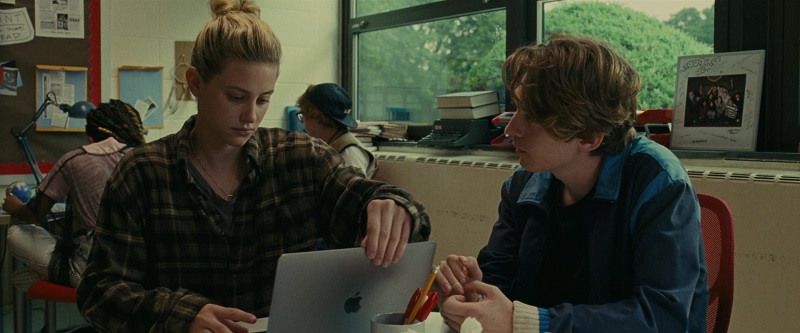If you have not seen Riverdale, you are not alone, but something I can guarantee is after experiencing Chemical Hearts, do not be surprised if you are overcome with the desire to inhale Lili Rinehart’s entire filmography. The star of the breakout hit is also a producer on the YA film that is as raw as it is riveting in its portrayal of a teenage girl who has been defined by a terrible tragedy and the boy (Austin Abrams) who gives her hope that love can rise like a Phoenix out of the ashes of despair.

Krystal Sutherland’s book, Our Chemical Hearts, was adapted by Richard Tanne, who also directed the film. Tanne brought the beloved novel to film with a tender touch that befits the subject matter. Reinhart must have read the book and saw herself in the role, as well as believing that as much as the written word touches millions, the art of film exponentially reaches audiences. The Riverdale breakout is also an executive producer and rightfully believed that this tale needs to be experienced by the masses. She possesses a stunning presence and the camera utterly adores her.
The key to the success or failure of this page-to-screen effort lies in casting and chemistry between the players. Abrams’ Henry Page and Reinhart’s Grace Town are an impeccable pair. What sets the electricity emitted by these two apart from other YA-born characters is how what they go through feels organic and not conjured in some Hollywood lab.
Chemical Hearts is told from the point of view of Page, who is a high school senior. Nothing of significance has occurred to him in his 17 years of living on this planet and he (rightfully) admits that makes it hard to be a writer. After all, some of the best writers in history have lived through some rough times and emerged with literary gold. Then again, perhaps Page is a little too hard on himself. After all, he is just a high school senior, and he has just been selected to be the school paper’s editor-in-chief. Town was a member of her school’s paper. She too is a senior, at a new school, and the teacher in charge of the school paper has tapped her to be co-editor in chief with Page.
There’s something about Town that compels Page. He cannot stop thinking about her. At first, he uses the guise of the school paper to spend time with her. Almost immediately, it is impossible not to be moved by the spark emitted from these two. She is, in her mind, damaged goods and it isn’t until we learn why that Chemical Hearts truly hits a home run in the emotive power department. It is truly awful what she experienced and given that, it is amazing that she even has pulled it together to attend a new school and even participate in any extra-curricular activities, such as the newspaper. Slowly, she lets Page in on her life and he learns why she walks with the help of a cane and how writing, for her, has allowed her to cope with unspeakable misfortune. Sadly, the teenager completely blames herself for it even happening.
Life is complicated and it is so refreshing when films reflect that and do not wrap everything up in a neat little bow. What occurs throughout Tanne’s film is not only believable but makes Chemical Hearts approachable for its target demographic, teens… as well as (and most importantly) anyone who has ever been a teenager, i.e. everyone!
I hate to be so cagey about plot details, but every single thing that happens to Page and Town are spoilers. That being said, what can be explored is the overall tone and the emotional tsunami that filmmakers achieve. The best YA films are only such because that’s what our protagonists are—young adults. The teenagers at the heart of these astounding YA tales are simply between the ages of 13 and 19 and what happens to them could happen to any of us at any age. That means the film is approachable. Many of us have been touched by tragedy and that serves as an instant bond that tethers us simultaneously to Town and to Page. For every soul touched by tragedy, there are multiple folks who achieve varying levels of success trying to be there for those hurting souls. It is that aspect of this story that should resonate profoundly.
Too often, the message in movies is only as effective as the messenger. On one hand, we have Page—a self-proclaimed individual whose life has been absent of anything of merit. On the other hand, there is Town—who could be easily defined by the horrors she experienced and the literal scars that serve as a constant reminder of a fatal mistake. Lucky for her, she does have the adoration of Page to help guide her through the darkness. True to life, it is often not enough. Sometimes, the only one who can save us… is us. It’s a powerful lesson and is just one possible outcome for our beloved characters in Chemical Hearts.

Reinhart has the toughest of needles to thread with her characterization. Her Grace has to be approachable, enough so that her pairing with our narrator/protagonist is something audiences pull for and cheer for as it happens. But also, she needs to be broken and in such a way that Grace believes that she is unfixable. How does an actress even begin that process? They say that talent rises and that could not be more the case with Reinhart and her inhabiting of Grace. She nails the nuances of a damaged soul, one who carries boatloads of guilt that is as crippling as the physical ailment that requires her to walk with a cane.
Meanwhile, her partner in crime, Abrams, would succeed in his part in this picture by simply not getting in the way of Reinhart! I jest, but sometimes that is the best thing a scene partner can do for a dramatic effort. In the watch what you wish for department finds his Henry getting an education himself in love, life, loss, and the harsh reality that can steal happiness in broad daylight. He has more than a fair share of subject matters to write about after his year with Grace. He no longer can say he’s never been in love. Through Abrams performance, we see a character emerge who discovers more about himself through others than garnered from 17 years of looking in the mirror. That is the young actor’s greatest triumph is being able to convey that element through his journey.
Tanne has a firm command of the source material. He poured his heart and soul into the pages of Sutherland’s novel. Often times, having an auteur bringing the written word to life is the best means to capture the essence of what touched countless hearts. As such, he or she can serve as the ideal vehicle for bringing what it is that struck readers emotively. Tanne penned the screenplay and as scriptwriter, could not be a better resource for his actors and everyone else on the set who are joined by a common bond—crafting something that fans of the novel will cherish as much, if not more so, than the page-turning experience.
Grade: A-

